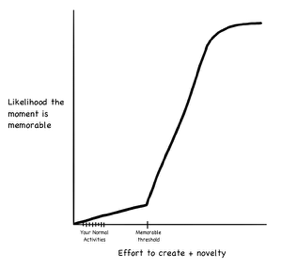Creating Memorable Moments
What is the right balance for spending effort to creating more meaningful and defining moments in our work and personal life?
This question arose as I read “The Power of Moments” by Chip and Dan Heath. They define a moment as a “short experience that is both memorable and meaningful”. A core idea from the book is to think about how we can be the authors of these moments. However, it takes extra time and energy to instrument these moments, which can get in the way of our already busy lives.
One example I found interesting was about transforming a classroom experience. Students in a high school English class were reading “The Lord of the Flies” when they received an official-looking legal complaint saying that the author would be on trial for misrepresenting human nature in the book. Each student had a role to play in the trial (witness, attorney, or judge) and two months to prepare before going to an actual courtroom to decide the author’s guilt. The students acted as famous witnesses from literature and history (ranging from Gandhi to Darth Vader) and gave testimonials on the nature of humanity. This trial turned a normal English class into one of the most memorable and interesting school experiences for many students who participated.
This was an exceptional outcome that took a substantial amount of effort to create. It made me reflect on how to balance effort with creating moments. For every potential moment, there seems to be a threshold of how much effort I need to expend to create a moment that is “memorable,” and that level of effort varies based on the context. Additionally, the more novel the activity is to me, the more likely it’ll be memorable. I’ve created a rough graph to explore this idea.

This graph estimates how likely a moment is to be memorable given the combination of the amount of effort we spent to create the situation and how novel it is. From reading the book and my own experiences, there appears to be a threshold where after you spend a certain amount of effort to make a special experience above what you would normally do, it starts to become much more likely the moment will be memorable. I’ve termed this the “memorable threshold”.
On most of our activities, we spend a small amount of effort and follow our usual script, such as going out to lunch at our local restaurant (below the memorable threshold). This can be a good experience, but is unlikely to be memorable. On the other end of the spectrum are events like the classroom trial or getting married. These events are more novel and take substantially more effort to create and consequently they are much more likely to be memorable, but it would be infeasible to plan such large experiences every day, even if you wanted to.
Even if we were to repeat a memorable event on a regular basis, the novelty would be reduced and these events would become more normal and less likely to be memorable. However, we could spend extra effort to take the event to an even greater level or change up the format to make it novel again. Letting more time pass between events can also increase the novelty; a meal at your local restaurant could be quite memorable if you go out to eat once a year.
Another key point from the book is to watch out for the voice of “reasonableness”. This voice reminds you something is impractical or “impossible” since it takes a lot of resources or is against the way things are normally done, and that voice can stop potential moments in their tracks. I’ve definitely experienced the voice of “reasonableness” many times (including being the one to state it) and I think we should be on guard against it when we’re trying to make something really memorable.
While I’m not sure where the correct balance lies in creating moments, I feel in most cases we are not spending enough effort to make memorable and meaningful moments and we would benefit from creating more of these moments. When I look back on the years, these memorable events stand out from the blur of time flowing by and were enriching and meaningful experiences in my life.
